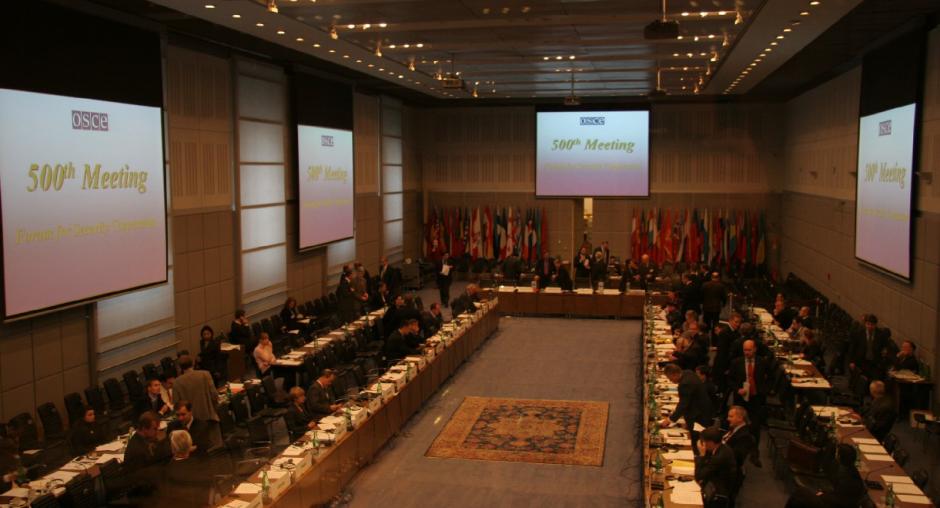Newsroom
OSCE's Forum for Security Co-operation outlines priorities for 2008
VIENNA 16 January 2008

(OSCE/Mikhail Evstafiev)The 500th meeting of the OSCE Forum for Security Co-operation in Vienna, 29 November 2006. (OSCE/Mikhail Evstafiev) Photo details
VIENNA, 16 January 2008 - The work of the OSCE Forum for Security Co-operation (FSC) this year will be guided by the Madrid Ministerial Decision outlining the priorities concerning the politico-military aspects of security. This was underlined at the first 2008 session of the Forum that took place in Vienna today.
"This was the first time in the FSC's history that a Ministerial Council adopted one unique global decision of this sort," said Luis Manuel Cuesta Civis, Secretary General for Defence Policy of the Spanish Defence Ministry. "This decision will serve as a basis for the activities of the Forum, and we hope that it will contribute to enhancing its role as one of the Organization's decision-making bodies."
Spain is chairing the FSC for the first four months of 2008, to be followed by Estonia and Finland.
At the Madrid Ministerial Council in November 2007, foreign ministers agreed a new decision to ensure that the 56 OSCE participating States focus on arms control, disarmament, confidence- and security-building measures, conflict prevention, and address new security challenges. The decision supported the UN Global Counter-Terrorism Strategy, and the FSC will work to implement UN Security Council Resolution 1540, which addresses the threat of proliferation of weapons of mass destruction in the hands of terrorists, by sharing experiences and identifying ways to assist participating States in implementing the Resolution nationally.
The Forum for Security Co-operation meets every week in Vienna to discuss arms control, military confidence-building measures and disarmament. It is distinct from the Permanent Council, the OSCE's regular political decision-making body.
In the coming months, the FSC will hold several major events: on combating anti-personnel mines (23 January), on small arms and light weapons and stockpiles of conventional ammunition (5-6 February), and on issues related to the 1999 Vienna Document (March), which will include a meeting of the Heads of Verification Centres.
There will be a joint FSC/Permanent Council meeting on 27 February, chaired jointly by Spain and Finland. The OSCE Annual Security Review Conference will also be held later this year.
Cuesta said the OSCE's Partners for Co-operation should actively participate in all FSC meetings and events: "This will help promote the Organization's norms, principles and commitments in their regions, and encourage them to take further steps towards their voluntary implementation".
OSCE Mediterranean Partners for Co-operation include Algeria, Egypt, Israel, Jordan, Morocco and Tunisia. Partners for Co-operation in Asia are Japan, South Korea, Thailand, Afghanistan and Mongolia.
"This was the first time in the FSC's history that a Ministerial Council adopted one unique global decision of this sort," said Luis Manuel Cuesta Civis, Secretary General for Defence Policy of the Spanish Defence Ministry. "This decision will serve as a basis for the activities of the Forum, and we hope that it will contribute to enhancing its role as one of the Organization's decision-making bodies."
Spain is chairing the FSC for the first four months of 2008, to be followed by Estonia and Finland.
At the Madrid Ministerial Council in November 2007, foreign ministers agreed a new decision to ensure that the 56 OSCE participating States focus on arms control, disarmament, confidence- and security-building measures, conflict prevention, and address new security challenges. The decision supported the UN Global Counter-Terrorism Strategy, and the FSC will work to implement UN Security Council Resolution 1540, which addresses the threat of proliferation of weapons of mass destruction in the hands of terrorists, by sharing experiences and identifying ways to assist participating States in implementing the Resolution nationally.
The Forum for Security Co-operation meets every week in Vienna to discuss arms control, military confidence-building measures and disarmament. It is distinct from the Permanent Council, the OSCE's regular political decision-making body.
In the coming months, the FSC will hold several major events: on combating anti-personnel mines (23 January), on small arms and light weapons and stockpiles of conventional ammunition (5-6 February), and on issues related to the 1999 Vienna Document (March), which will include a meeting of the Heads of Verification Centres.
There will be a joint FSC/Permanent Council meeting on 27 February, chaired jointly by Spain and Finland. The OSCE Annual Security Review Conference will also be held later this year.
Cuesta said the OSCE's Partners for Co-operation should actively participate in all FSC meetings and events: "This will help promote the Organization's norms, principles and commitments in their regions, and encourage them to take further steps towards their voluntary implementation".
OSCE Mediterranean Partners for Co-operation include Algeria, Egypt, Israel, Jordan, Morocco and Tunisia. Partners for Co-operation in Asia are Japan, South Korea, Thailand, Afghanistan and Mongolia.
